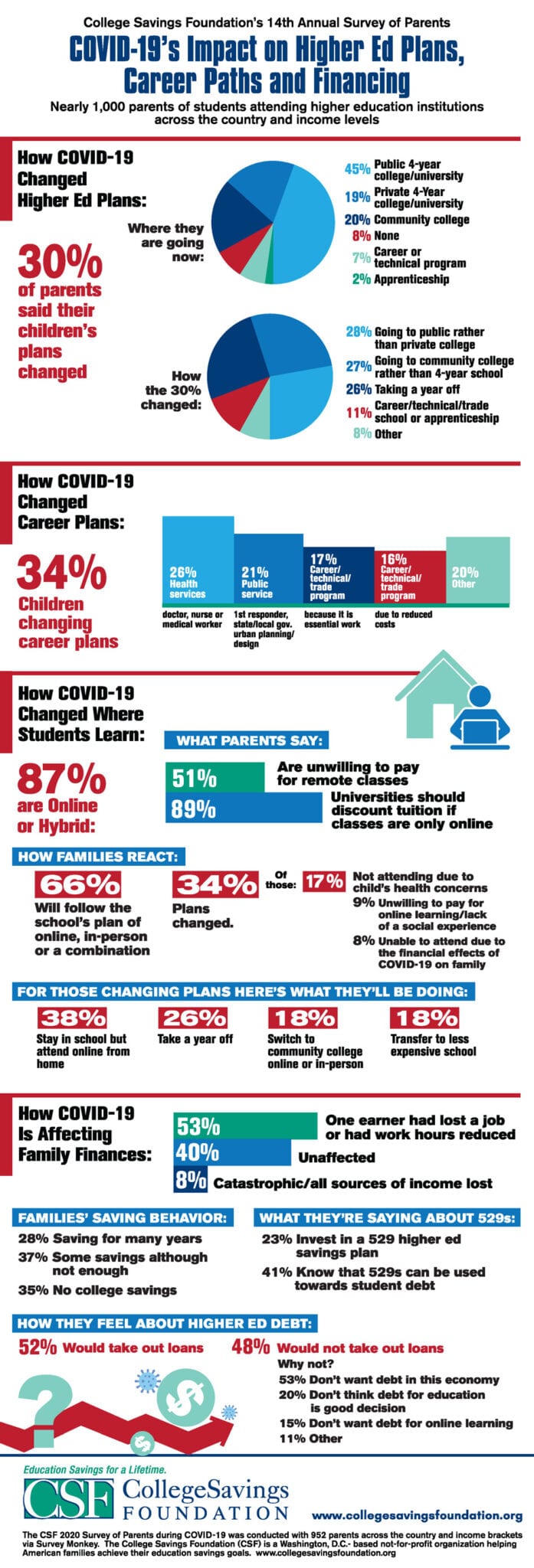

Half of parents balk at full tuition for online courses; 89% want discounts
Washington, DC, September 18 – For students and their families heading to higher education this fall, COVID-19 has made a mighty impact on their education paths, their career plans and their financing decisions. A survey of nearly 1,000 parents across the country found that one-third (34%) of their college-age children had changed their career plans; and 30% had altered the kind of higher ed institution they planned to attend – with most of those attending public rather than private college, going to a community college rather than a 4-year school, or taking a year off entirely.
“The COVID-19 pandemic has upended what higher education looks like for students across the country; and now parents are adjusting their expectations in terms of how their children are learning and what they are paying for,” said Vivian Tsai, Chair of the College Savings Foundation, the nonprofit helping American families save for higher education that conducted the survey.
This is the 14th consecutive year that CSF has surveyed parents, but the special 2020 Survey of Parents during COVID-19, released during College Savings Month, focused solely on parents of students who had just graduated high school or were already enrolled in postsecondary education or training.
The vast majority of students – 87% – will be either completely online (47%) or a mix of online and in-person learning on campus (40%). More than half (51%) of all parents said they were not willing to pay full tuition for remote classes and an overwhelming 89% said that traditional, in-person universities should discount tuition if classes are offered only online.
A stark backdrop to these findings is the effect of COVID-19 on families’ income. The majority of parents, 53%, said that one earner had lost a job or had work hours reduced and almost 8% had a “catastrophic” experience with all sources of income lost; only 40% were unaffected by COVID-19..
Despite these challenges, two-thirds of parents exhibited sound higher education funding strategies, with 28% saving for many years and 37% having some savings, “although not enough.” Overall, 23% of all parents surveyed invest in 529 higher education savings plans for their children, yet only 41% of all parents know that they can also use 529 plans to pay student debt.
Parents also said they were avoiding debt in paying for their child’s higher education: 48% said they weren’t taking out loans, with 53% of those explaining that they do not want to take out debt in this economy and 20% saying they do not think debt for education is a good idea ever.
“We are heartened to learn that families have maintained sound savings strategies that support their children’s higher education goals during a changing and challenging environment,” Tsai added.
The following is a snapshot of what families said about their children’s plans as of the first week in September 2020:
Higher education plans:
Career plans:
Online vs. in-person learning:
The CSF 2020 Survey of Parents during COVID-19 was conducted with 952 parents across the country and income brackets via Survey Monkey. The College Savings Foundation (CSF) is a Washington, D.C.- based not-for-profit organization helping American families achieve their education savings goals.
